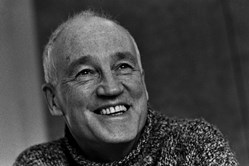 Mike Daly* argues that professional validation, far from being a straitjacket, fosters creative responses.
Mike Daly* argues that professional validation, far from being a straitjacket, fosters creative responses.
“Events dear boy, events” was reputedly Harold Macmillan’s reply to a journalist’s question about what is most likely to throw governments off course. This doesn't just apply to governments; individuals also experience events. Life has a habit of throwing them up - when we least expect them. It is then that we realise the importance of support from friends, colleagues and institutions. We also face the reality of how well we have developed ourselves to deal with the environment in which we operate, and the threats it sometimes presents.
Core
It is not a coincidence that these two key characteristics are at the core of being a Chartered Geologist (CGeol). Professional support and recognition throughout a career provide the validation that sustains us. That support is conditional on continued professional development that keeps us abreast of changes, both inside and outwith our science.
Reflecting on my own career, I spent my first 10 years as a field geologist in Africa. I loved the individuality and productivity of that role. But with time, I realised that I was learning a lot about Africa but becoming detached from the geoscience that had led me there. A friend drew me back to British academia, ultimately equipping me for a role as a structural geologist and, later, an executive in BP. This was crucial early-career validation and a very deep dive in continued professional development. I wasn't a CGeol, but inadvertently I followed the path laid out to become a CGeol today.
So why is being a CGeol debated so much in the UK, particularly by non-Engineering related geologists? Very thoughtful people argue that being a CGeol is a constraint on creativity, an unnecessary formality of little use to many geoscientists.
During my 40 years as an active geoscientist much has changed inside our science and in the technology that underpins it. Outside our science things have also changed, especially in the world of regulation, governance and legal compliance. This latter, complex and un-scientific world, envelops geoscientists whether they like it or not - scrutinising the integrity of the science they publish; the use of confidential data they hold, and the impact of the decisions they make.
Intrusive
Such changes can be felt as intrusive, controlling and a constraint on creativity and risk-taking. However, the objective is not that. Rather, it is to ensure risk-taking and creativity happen in a context as full of knowledge and understanding of the potential consequences as possible. My industry, oil and gas, delights in stories of heroic risk-taking that came off. What it rarely speaks about are the failures that, in hindsight, could have been avoided. Such cases are often a failure of discipline and process, far more than the romantic notion of a geoscientist’s ‘gut feel’.
Similarly, the rigour of being a CGeol is not to constrain or stifle but rather to enable and support through professional validation and personal development. I believe that this is an increasingly essential component of being a geoscientist in 21st Century. In an ever more litigious world, powerful legal systems can be unable or unwilling to value experience; they require formal evidence of professional competence. The validation of being a CGeol provides that evidence. And having that CGeol status may one day give you crucial support when “events” come along to throw you off course.
* Mike Daly joined Tullow in 2014 as a non-executive director, after a 28-year career with BP, from which he retired as Head of Exploration in 2013.